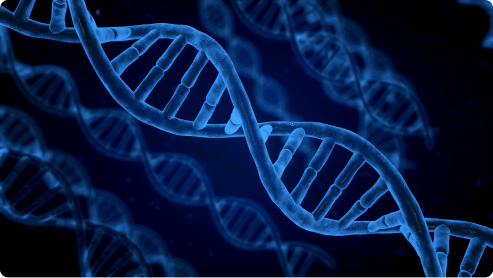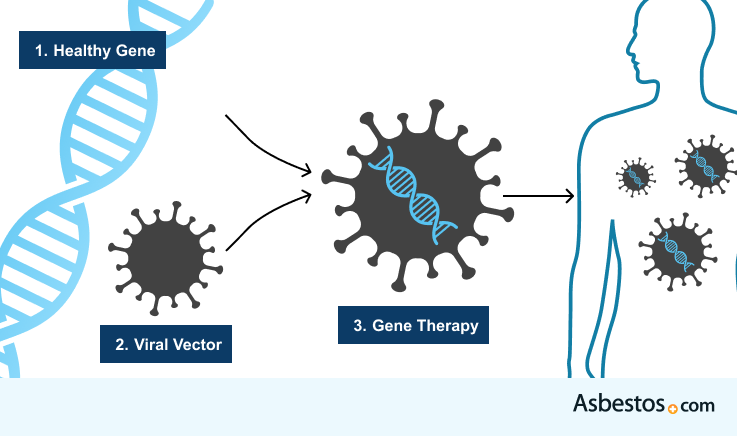Genetic Risk Factors for Mesothelioma
Genetic testing for mesothelioma is key for early detection, treatment and survival. Research suggests genetic risk factors, such as a mutated BAP1 gene, increase the likelihood an individual will develop mesothelioma as a result of asbestos exposure.

How Does Genetics Impact Mesothelioma Risk?
Research shows that some genes might raise the risk of mesothelioma after asbestos exposure. The risk also depends on how much and how long someone is exposed to asbestos. Some genes might explain why some people are more prone to diseases from asbestos
Mesothelioma can occur in people after minimal exposure to asbestos. The most well-known mesothelioma genetic risk factor is BAP1, a tumor-suppressor gene. Several studies show a BAP1 mutation is a risk factor for mesothelioma.
About 12% of mesothelioma cases develop in people with mutations of BAP1 or other genes. Prevention is crucial for those at risk.
BAP1 Gene and Mesothelioma
In 2007, scientists studied families in an area of Turkey known for asbestos exposure. They found that a BAP1 gene mutation increases the risk of mesothelioma.
After several years of studying a unique mesothelioma epidemic in Cappadocia, Turkey, we noted that in certain families, up to 50% of family members developed mesothelioma. We demonstrated that susceptibility to mesothelioma was transmitted genetically from one generation to the next.
Another study evaluated two U.S. families with high incidences of mesothelioma. Researchers found a BAP1 mutation in every family member with mesothelioma. Additional research has also linked this gene to mesothelioma..
Is Mesothelioma Hereditary?
Mesothelioma is not hereditary. However, some people inherit genes that raise their risk after asbestos exposure. For instance, those with a mutated BAP1 gene face a higher risk if exposed to asbestos, the main cause of mesothelioma.
The BAP1 gene controls calcium in cells. If it’s damaged or mutated, calcium levels fall. This raises cancer risk from substances like asbestos. For those with a BAP1 mutation, asbestos exposure raises mesothelioma risk.

Understand your diagnosis, top doctors and ways to afford care.
Get Your Free GuideUsing Genetics to Treat Mesothelioma
Some researchers believe that fixing genetic mutations may help prevent and treat mesothelioma. For example, a 2017 Nature study found that a normal BAP1 gene and repaired calcium channels led to positive chemotherapy results.
You cannot fix something unless you know what is broken. We discovered the first, and so far, only known biological mechanism that makes some people more susceptible. The fixed channels should be able to prevent cancer in people who have inherited the mutation. It can also help treat cancers whose tumor cells have developed mutations.
A clinical trial set to wrap up in 2026 is testing a drug called TAK-500 that targets immune system genes. The hope is that the drug will stimulate the immune system to attack mesothelioma.
In 2018, a clinical trial tested the immunotherapy drug olaparib, or Lynparza. Researchers aimed to see how well it worked for pleural and peritoneal mesothelioma.
Lynparza is a protein inhibitor effective against breast and ovarian cancers. It targets the BRCA gene, a close relative to BAP1. Researchers hoped for similar results in mesothelioma, but it proved ineffective.
How Genetics Impact Prognosis
Doctors have a hard time predicting how long mesothelioma patients will live. Genetic testing may improve estimates of how long someone may survive with mesothelioma.
A 2022 research study noted that DNA could show a patient’s resistance to chemotherapy drugs. Another 2022 study looked at the effects of BAP1 status on survival. About 60% of participants had BAP1 loss. In those patients, median survival after chemo was longer by almost 13 months.
The Proceedings of the National Academy of Sciences looked at mesothelioma in 2019. They studied how DNA repair genes impact mesothelioma survival. Patients with a DNA suppressor gene mutation survived longer than those without.
| With Mutation | Without Mutation |
|---|---|
| 7.9-year median survival | 2.4-year median survival |
BAP1 increases the risk of developing mesothelioma but also improves long-term survival. Research shows they respond better than the average patient. This might mean people with this mutation could get more aggressive treatment.

Try our new clinical trials search tool to find active trials near you. Get help enrolling today.
Find a Clinical TrialOther Genetic Biomarkers of Mesothelioma
Ongoing studies continue to explore the link between gene mutations and cancer. Researchers hope to learn more about what causes tumors to grow and mutate.
Some drugs and treatments can prevent genetic mutations and treat cancer. Gene therapy is a field of medicine that aims to repair genes to prevent and treat tumors.

Researchers in Belgium studied a family with a history of mesothelioma in 2014. Investigators ruled out BAP1 as a cause of mesothelioma in this family. They identified 11 other possible gene mutations.
The most prominent mutation was RBM15. The study could not prove these mutations caused mesothelioma or other cancers.
Many mutations correlate with other cancers. Gaining a better understanding of these mutations helps researchers personalize treatment further. Several drugs that target those mutations already exist.
Recommended Reading



